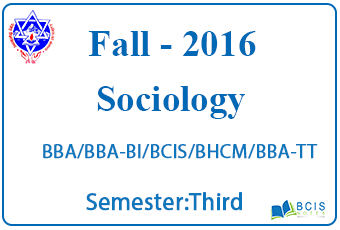
| Level: Bachelor | Semester – Fall | Year: 2016 |
| Programme: BBA/BBA-BI/BBA-TT/BCIS/BHCM/BHM | Full Marks: 100 | |
| Course: Fundamentals of Sociology | Pass Marks: 45 | |
| Time: 3hrs. | ||
| Candidates are required to give their answers in their own words as far as practicable. |
| The figures in the margin indicate full marks. |
| Section “A”
Very Short Answer Questions Attempt all the questions. |
10×2 |
|
| 1. | List any four subject matter of sociology. | |
| 2. | Mention the key elements of Fredric Jameson’s Post Modernism society. | |
| 3. | What is organizational culture? Give an example. | |
| 4. | Differentiate between formal and informal organizations. | |
| 5. | Why caste is called an endogamous group? | |
| 6. | Write any four functions of the family. | |
| 7. | Write about any two features of capitalism? | |
| 8. | Why education is crucial for functioning society properly? | |
| 9. | How social change occurs according to the conflict theory? | |
| 10. | How do you differentiate sexual violence and prostitution? | |
| Section “B”
Descriptive Answer Questions Attempt any six questions |
6×10 |
|
| 11. | What is sociology? Why sociological Knowledge is important in the field of business and management? | |
| 12. | What are the key assumptions of the main founding fathers of sociology? Critically analyze the basic views of functionalism. | |
| 13. | Define organization. Discuss bureaucratic characteristics as mentioned by weber. | |
| 14. | Define socialization. Discuss the types and agents of socialization. | |
| 15. | Explain functional and conflict approaches social stratification. | |
| 16. | Define social institution. Discuss religion as a fundamental social institution in Nepalese society. | |
| 17. | Discuss technology as a principal factor of social change. Illustrate the impact of technology on Nepalese youth and culture. | |
|
18. |
Section “C”
Case Analysis Read the following case and answer the questions. Chepangs are one of the semi-tribal groups of Nepal. The population of Chepang people in Nepal is 52, 237, which represents only 0.23% of the total population of Nepal. The literacy rate of Chepang people is only 13.9 percent. They have their own language, which belongs to one of the Tibeto-Burman strains. They are generally considered to be shy and easily dominated by other ethnic groups, who have been migrating from the mountains to the lowlands for the last 40-50 years. Chepang people are well known for shifting cultivation practice which is the main source of livelihood for almost all of them. Shifting cultivation practice is known as khoriyakheti in Nepali. There is a common saying that if you find a Chepang household, there must bekhoriya nearby. Farming alone is not enough to sustain their family food requirements for the whole months in a year. Other traditional occupations are hunting, fishing, and collecting edible shoots and roots. Nowadays, they do wage labor and earn some money. These occupations are especially important during the periods of food scarcity, which they face every year. Being hunter-gatherers until about 80 years ago, the Chepang are considered among the semi-nomadic and most primitive indigenous peoples of Nepal. Evidence suggests that they are highly forest-dependent as well as among the poorest and marginalized in Nepal. Chepang people heavily depend on wild foods for their subsistence living. They collected root crops, herbs, and fruits from their nearby forest and streambank. Wild foods like Dioscoreadeltoidea and Urticadiocaare linked with their traditions and cultural identity. They have generated enormous knowledge on a large number of plant species on which they have depended for centuries. Due to this, forests were the most important resources for them in terms of food, fiber, medicine, housing materials, fodder, and various other needs. a) What is the status of Chepang in Nepal? How they are different from other ethnic group? b) Evaluate the social life of Chepang. What type of primitive knowledge do they have? c) How Chepangs are maintaining their livelihood? Do they have the good economic condition? d) If you are selected as a manager of an INGO to work for the Chepang community; what programs do you make to uplift their socio-economic status? |
20
|
You may also like: Sociology || Spring 2016 || Pokhara University

Leave a Reply